On this Women’s Day, as we celebrate women’s remarkable achievements and resilience worldwide, it is essential to reflect on initiatives that empower and uplift women in meaningful ways. One such initiative is the JAARI Fellowship, facilitated by the ifa (Institut für Auslandsbeziehungen) and implemented by Parindey in Pakistan and Tartak in Nepal, which gives South Asian women faith despite gender inequity and limited prospects.
The Trauma-Centered Jaari Fellowship, launched in October 2023, aimed to bolster women’s capacities in advocating for and safeguarding their rights, incorporating trauma healing into programs and organizations, and designing tailored peacebuilding initiatives within their communities. Through a collaborative effort, women peacebuilders from Pakistan and Nepal came together to foster healing and resilience through virtual sessions, culminating in a three-day in-person retreat.
This fellowship has not only provided a platform for women to develop skills and knowledge in trauma healing and peacebuilding. However, it has also created a powerful network of women committed to driving positive change in their communities. The impact of this fellowship extends far beyond the duration of the program, leaving a lasting legacy of empowerment and unity.
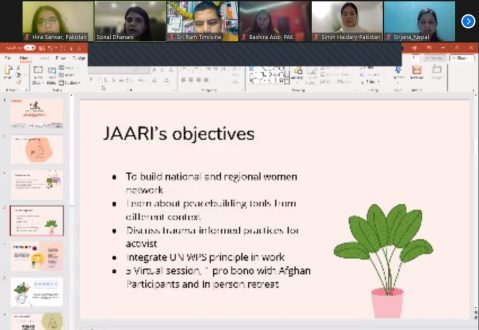
In South Asian countries, women often face significant challenges related to mental health, exacerbated by pervasive gender inequality and limited access to opportunities for decent work and sustainable development. The impact of these issues extends beyond the individual, affecting both the women themselves and their families. The unequal distribution of resources and opportunities places women in a position of dependence, limiting their ability to fully exercise their agency and live with a sense of freedom.
According to figures from mental health organizations, a significant proportion of women in South Asian countries lack access to adequate mental health care. Limited resources, coupled with the societal stigma surrounding mental health issues, create substantial barriers to seeking help. The repercussions of unaddressed mental health challenges among women can extend to their families and communities, perpetuating a cycle of instability and hindering sustainable development.
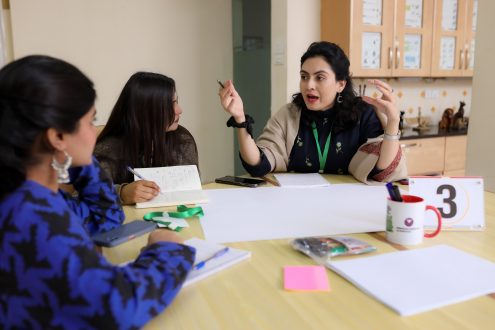
In addition to unequal access to education and employment opportunities, women often find themselves subjected to various forms of violence, including domestic abuse and discriminatory practices. These factors collectively contribute to a cycle of trauma that affects not only the individual well-being of women but also the overall stability and prosperity of the communities they belong to.
In 2015, Sonal Dhanani started a new chapter in Pakistan by establishing Parindey, a trailblazing Pakistani organization that combines art, healing, and community building. Sonal has spearheaded Parindey’s groundbreaking efforts to combat violent extremism by innovatively fusing the arts, music, and movie therapy. She is an enthusiastic trainer, creative professional, and art-as-therapy practitioner.
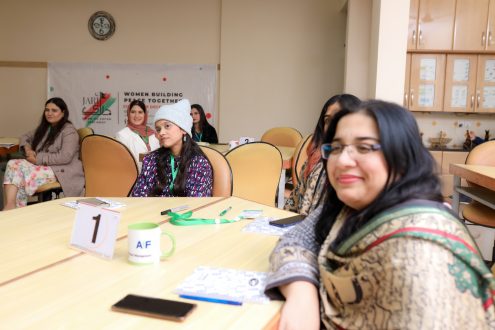
In a country with low mental health awareness, especially in less affluent places, the organization has emerged as an oasis of optimism, reaching out to populations facing daily challenges. Parindey’s commitment extends beyond traditional tactics, as they offer stimulating programs to reduce mental stress and encourage participants to become peacemakers.
Highlighting a comprehensive approach to mental health, Parindey has pioneered cinema therapy in Pakistan in addition to providing art and music therapy to thalassemia patients. Parindey’s mission is to build a community that listens to, supports and empowers those going through tough times by promoting creativity and breaking down the stigmatization of mental health.
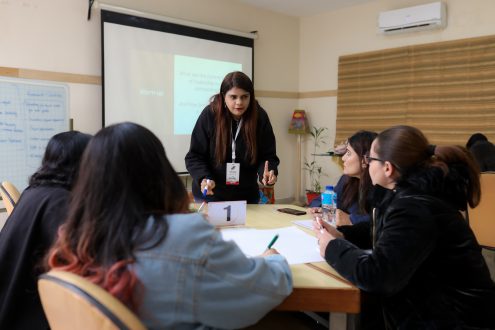
Dhanani brings together a diverse group of dynamic individuals from Pakistan who are committed to driving positive change in their respective fields. Kaloom Brohi, the founder of Niyari Education & Development Organization, is a passionate women’s and girls’ rights activist focusing on peacebuilding.
Also Read: Begum Shaista Ikramullah – Architect of human rights advocacy and diplomacy
Nazia Aslam, a dedicated educationist and Ph.D. scholar, has extensive experience in the education department and is actively involved in community development, digital literacy projects, and teachers’ professional development.
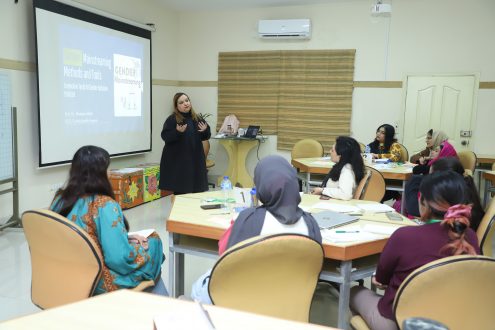
Savera Manzoor, a doctor by profession and social activist at heart, founded “Sheroes” to offer hope to domestic abuse victims. Laila Batool, a researcher and quality assurance inspector, contributes to a Chinese Business Consulting Firm. Kiran Kumari, a ray of light, conducts training programs for girls in Tharparkar to help them realize their potential beyond traditional roles.
Hira Sarwar, a postgraduate scholar, focuses on foreign policy, cultural diplomacy, and non-traditional security threats. Hadiqa Bashir, an executive director, works towards human rights, gender equality, and climate change goals. Simin Haidary, a women’s rights advocate from Afghanistan, empowers women through mental awareness programs.
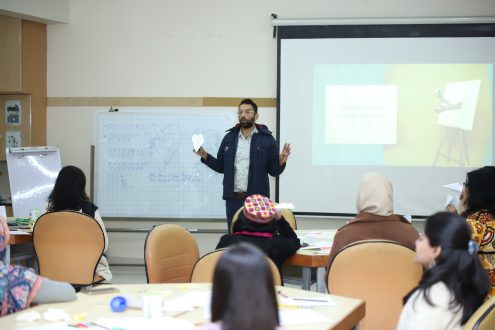
Saira Zahid, a marketing specialist and cyclist, leads Amn Movement, advocating for human and minority rights. Muqadsa Zaineb, an intersectionality and climate justice advocate, founded “Nikahnama Prho” to empower women about their rights. Zareena, an educator, is dedicated to promoting accessible and high-quality education, mental health awareness, and adult literacy.
Sidra Abbas, a gender equality activist and writer, founded GirlTalk Pk to address women-centered issues. Zaibun Nisa, an MPhil scholar and research assistant, supports cross-cultural interactions, conscious parenting, and environmental education. Abeer ul Haq Usmani, a clinical psychologist, focuses on creative clinic practices and gender-based issues.
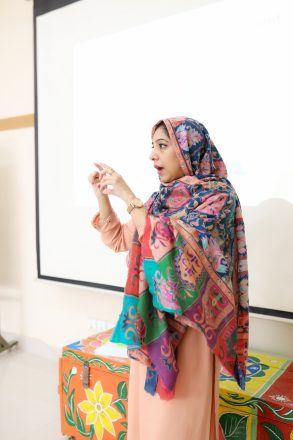
Hira Khalil, a sustainability advocate, crafts digital strategies for positive change. Sahrish Kashif, a social activist, leads initiatives on menstrual health, gender equality, and peacebuilding. Narmeen Latif, a certified English language teacher and trainer, works for women’s rights and empowerment in a male-dominated society. These fellowship participants form a dynamic cohort that facilitates positive societal change.
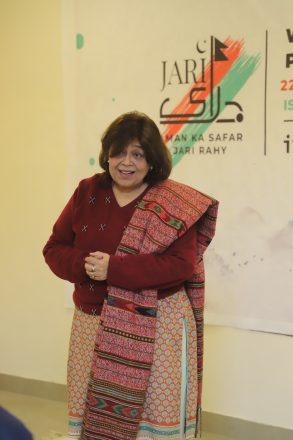
The fellowship’s influence reflects its dedication to unity and empowerment. The Trauma-Centered Jaari Fellowship addressed trauma through powerful sessions that developed a deep sisterhood among its participants. It became a transformative force, allowing women to move past their pasts and into a future full of resilience and unity.
The theme of Jaari Fellowship Aman ka safar Jaari rahy (May the journey towards peace continue) signifies the enduring commitment of the Jaari Fellowship to creating harmonious societies. The program’s success lies in its ability to forge connections, share tools and strategies for sustainable peace, and acknowledge women’s essential role in fostering peace.
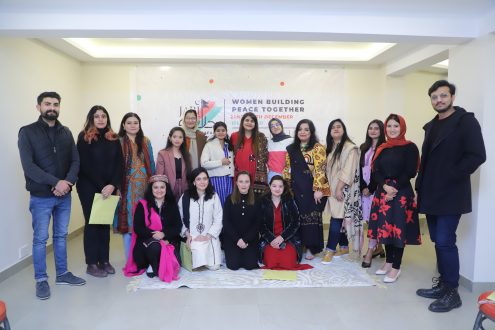
Each participant in the Trauma-Centered Jaari Fellowship brought a unique perspective and expertise, contributing to a diverse and dynamic cohort dedicated to societal transformation. In essence, the Trauma-Centered Jaari Fellowship has left an indelible mark on women’s empowerment, contributing significantly to the resilience and well-being of women in Pakistan and Nepal.
International Relations Scholar interested in National Security strategies, with a good focus on Geo-Politics, Foreign Policy, and Public & Cultural Diplomacy.

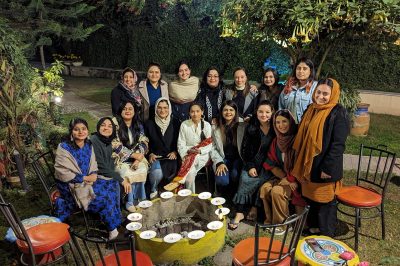






One response
How I can be the the part of this program ?